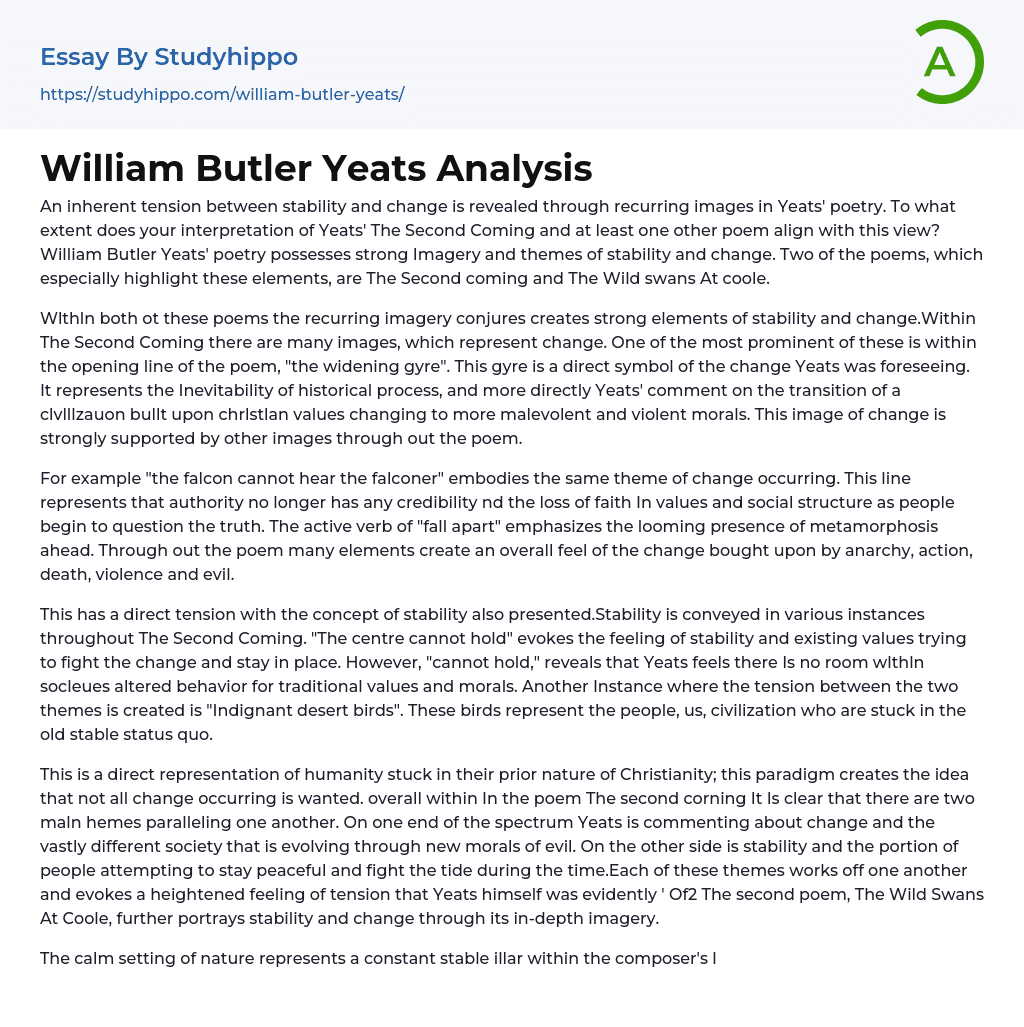An inherent tension between stability and change is revealed through recurring images in Yeats' poetry. To what extent does your interpretation of Yeats' The Second Coming and at least one other poem align with this view? William Butler Yeats' poetry possesses strong Imagery and themes of stability and change. Two of the poems, which especially highlight these elements, are The Second coming and The Wild swans At coole.
Wlthln both ot these poems the recurring imagery conjures creates strong elements of stability and change.Within The Second Coming there are many images, which represent change. One of the most prominent of these is within the opening line of the poem, "the widening gyre". This gyre is a direct symbol of the change Yeats was foreseeing. It represents the Inevitability of historical process, and more directly Yeats' comment on the transi
...tion of a clvlllzauon bullt upon chrlstlan values changing to more malevolent and violent morals. This image of change is strongly supported by other images through out the poem.
For example "the falcon cannot hear the falconer" embodies the same theme of change occurring. This line represents that authority no longer has any credibility nd the loss of faith In values and social structure as people begin to question the truth. The active verb of "fall apart" emphasizes the looming presence of metamorphosis ahead. Through out the poem many elements create an overall feel of the change bought upon by anarchy, action, death, violence and evil.
This has a direct tension with the concept of stability also presented.Stability is conveyed in various instances throughout The Second Coming. "The centre cannot hold" evokes the feeling of stability and existin
values trying to fight the change and stay in place. However, "cannot hold," reveals that Yeats feels there Is no room wlthln socleues altered behavior for traditional values and morals. Another Instance where the tension between the two themes is created is "Indignant desert birds". These birds represent the people, us, civilization who are stuck in the old stable status quo.
This is a direct representation of humanity stuck in their prior nature of Christianity; this paradigm creates the idea that not all change occurring is wanted. overall within In the poem The second corning It Is clear that there are two maln hemes paralleling one another. On one end of the spectrum Yeats is commenting about change and the vastly different society that is evolving through new morals of evil. On the other side is stability and the portion of people attempting to stay peaceful and fight the tide during the time.Each of these themes works off one another and evokes a heightened feeling of tension that Yeats himself was evidently ' Of2 The second poem, The Wild Swans At Coole, further portrays stability and change through its in-depth imagery.
The calm setting of nature represents a constant stable illar within the composer's life. "The nineteenth autumn" is a reflective line that refers to the time that has passed within the composer's life, however the natural element of autumn represents the continuity of nature and the stability it offers and represents.However, an alternative reading of "autumn" can view this as a representation of change and it is the season where major change goes on in the environment. This clearly highlights the tension between the two
themes as the composer communicates how even something as stable and constant as nature can still uccumb to change.
"All's changed since l, hearing the twilight" again includes major ideas of transition, twilight is the time where day becomes night and the end comes. The composer is reflecting upon the twilight of his life, his lack of youthfulness and inevitable aging.However the change is strongly Juxtaposed with the timelessness of nature and it's inability to ever grow old, as it is a never-ending cycle. The Wild Swans At Coole is Yeats' most relevant poem to highlight the tension between stability and change. The composer of the poem is reaching the twilight of heir life and looking around not knowing how to handle the transition and aging of their life, while all around them the beauty of nature and it's inability to ever grow old and cease to exist taunts them.
Overall, the two poems The Wild Swans At Coole and The Second Coming by W. B. Yeats both embody the themes of change and stability fghting against one another. In both a melancholic and remorseful tone is evoked through the utilization of recurring imagery and literary techniques.
The two poems communicate the composer's own ideas about the change within their micro and macro world and his personal yearning for stability.
- Book Summary essays
- Metaphor essays
- Reader essays
- Rhyme essays
- Literary devices essays
- Villain essays
- Books essays
- Genre essays
- Literary Criticism essays
- Writer essays
- Protagonist essays
- Simile essays
- Poem essays
- Book Report essays
- Book Review essays
- Greek Mythology essays
- Plot essays
- Tragic Hero essays
- Coming of Age essays
- Play essays
- Rhetoric essays
- Rhetorical Question essays
- Translation essays
- Understanding essays
- Reason essays
- Character essays
- Letter essays
- American Literature essays
- Literature Review essays
- Utopia essays
- Poetry Analysis essays
- Dante's Inferno essays
- Between The World and Me essays
- Incidents in The Life of a Slave Girl essays
- Flowers for Algernon essays
- Myth essays
- Everyday Use essays
- Boo Radley essays
- Genesis essays
- Richard iii essays
- Alice in Wonderland essays
- On the road essays
- Ozymandias essays
- The Nightingale essays
- Holden Caulfield essays
- Animal Farm essays
- 1984 essays
- A Hanging essays
- Shooting An Elephant essays
- A Tale Of Two Cities essays




